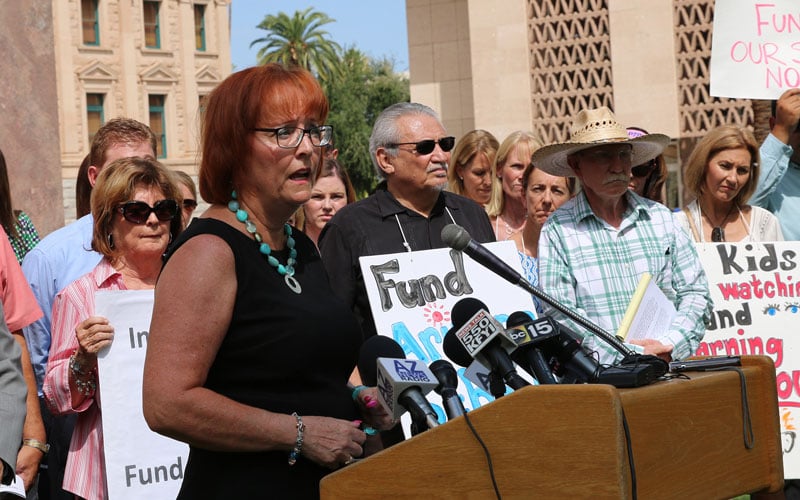
Jennifer Johnson, executive director of Support Our Schools AZ, addresses a news conference at which advocates called for a special legislative session to provide hundreds of millions of additional funding courts have ordered. (Photo by James Anderson/Cronkite News)
The state’s failure to pay public schools hundreds of millions in court-ordered funding has chased competent teachers from classrooms, education advocates said at a demonstration Thursday.
“Programs have been cut. Class sizes have risen because the Legislature has consciously made the decision not to adequately fund public education, despite a court ruling,” said Jennifer Johnson, executive director of Support Our Schools AZ .
Support Our Schools AZ gathered with a dozen advocacy groups at the State Capitol to demand the Legislature pay money that courts have ruled is owed because lawmakers failed to make inflation adjustments to education funding as required by a voter-approved law.
The first installment of around $330 million has been stalled while state leaders and plaintiffs have negotiated unsuccessfully on a settlement. The total owed has been estimated at around $1.6 billion.
Speakers at the news conference called on Gov. Doug Ducey to immediately schedule a special session to make the payment.
“Our children do not escape accountability because they are finding it inconvenient or not in the mood or disagree with it,” Johnson said. “Parents hold the governor and the Legislature to the same high expectations and high standards and insist that they follow court orders, respect authority and do what is right for our children.”
Plaintiffs successfully argued that during the Great Recession state leaders failed to follow Proposition 301, which voters approved in 2000 to require automatic inflation adjustments for education. Arizona hasn’t made the adjustments since 2009.
The Legislature has appealed a Court of Appeals ruling saying the state owes school districts the money, and settlement talks in the ended in failure last month.
Anthony Flemings, a participant in the rally, said his wife left her job as an educator because of low pay.
“We saw that she wasn’t making as much as she should have been, and we were still putting out massive amounts of her yearly wage to help bring in those funds to her classroom to make sure students had what they needed,” he said.
Another day at the capitol for @cronkitenews. A press conference on the funds the state was ordered to pay schools. pic.twitter.com/WSG0O3Yo8J
— James Anderson (@JamesAnders94) September 3, 2015
Johnson said the underfunding has put other strains on education.
“Larger class sizes, old textbooks, lack of technology, old school buses – the list goes on and on,” she said.
Ducey spokeswoman Annie Dockendorff said in an email that those calling for a special session “are a little late to the game.”
“Governor Ducey has been calling for an end to this lawsuit since his first week in office and is open to any discussion that puts more money in our schools and doesn’t raise taxes,” the email said. “He’s also put forward a plan to put $2.2 billion into our schools, for our kids. Are these parties willing to join in his effort and rally support? Will they actively lobby Democrats for votes?”
Ducey and his supporters are aiming for an alternative source of money to pay the schools: using additional proceeds from state trust land to boost education funding over 10 years. Voters would have to approve that plan.
State Rep. Paul Boyer, R-Phoenix, chairman of the House Education Committee and a teacher at Veritas Preparatory Academy in Phoenix, said he is asking Ducey to call a special session to address the land trust proposition.
He said the advocates who are seeking immediate payment are asking for something that doesn’t yet have an answer.
“Nobody knows except for those parties, and the judge has ordered strict confidentiality that they can’t share what the arguments on the table are,” Boyer said.